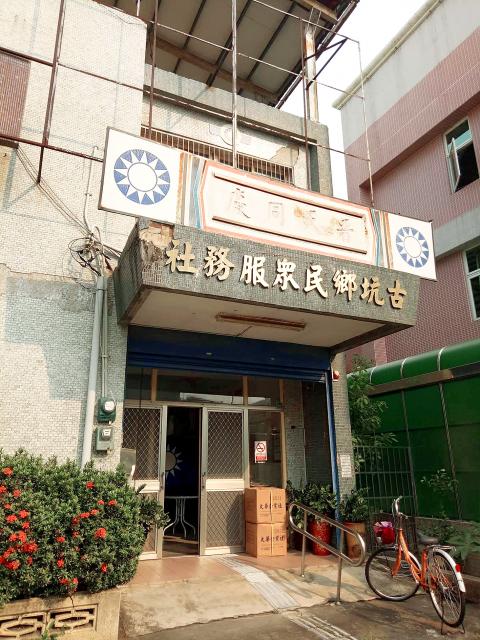The Ill-gotten Party Assets Settlement Committee is to investigate alleged links between the Republic of China Public Service Association and the Chinese Nationalist Party (KMT) next month to determine if the association was a KMT affiliate helping the party consolidate its rule during the authoritarian era.
Association members were allowed to combine their years working at the association with the time they spent in the government jobs to qualify for pensions, a privilege granted to members of the KMT and civil-service organizations believed to be affiliated with the party, the committee said.
It has identified the association as the primary target of its investigations this year and is to convene a hearing early next month.

Photo: Huang Shu-li, Taipei Times
Founded in 1952, the association established more than 300 branches in cities and counties across the nation, and most branches shared offices with local KMT chapters and China Youth Corps chapters, the committee said.
The association opened some branch offices in government buildings, such as township offices, by drawing on its connection with the KMT, the committee added.
“The association is an undercover [KMT] chapter used by the party to control and assimilate ordinary Taiwanese,” the committee said.
Former president Chiang Kai-shek (蔣介石), while chairing a KMT Central Standing Committee meeting in November 1954, ordered improvements to be made to association workshops, the committee said.
“Most of the comrades working in association workshops are idly standing by instead of acting proactively to offer services to the public. Young, passionate comrades fluent in Hoklo [also known as Taiwanese] should be appointed to work in the workshops,” Chiang instructed at the time, it said.
During the authoritarian era, the lines between the state and party were blurred, and KMT employees posted to the association were transferred to local government positions, while township office employees were appointed to the association, resulting in abuses of the pension privilege, an unnamed member of the asset committee said.
According to the KMT’s organizational structure, the association’s structure was stratified, with its headquarters established under the KMT and branches of different levels established in accordance with provincial and local governments, it said.
Branches at the township level were also founded to infiltrate communities to organize KMT operations, the committee member said.
Following the military crackdown on Taiwanese during the 228 Incident, society became polarized, and the association was founded as a non-political civil service organization to assimilate Taiwanese and guarantee their support for the KMT in local elections, the committee member said.
Eleven plots of land and 11 buildings are registered under the association, and while some land has been purchased from private individuals, half of the association’s land was illegally acquired from the government, the committee said.
The ownership of most association buildings belongs to KMT-run companies, including Central Investment Co, Guanghua Investment Co, Yuhua Co and Yutai Development Co, the committee said.

‘DENIAL DEFENSE’: The US would increase its military presence with uncrewed ships, and submarines, while boosting defense in the Indo-Pacific, a Pete Hegseth memo said The US is reorienting its military strategy to focus primarily on deterring a potential Chinese invasion of Taiwan, a memo signed by US Secretary of Defense Pete Hegseth showed. The memo also called on Taiwan to increase its defense spending. The document, known as the “Interim National Defense Strategic Guidance,” was distributed this month and detailed the national defense plans of US President Donald Trump’s administration, an article in the Washington Post said on Saturday. It outlines how the US can prepare for a potential war with China and defend itself from threats in the “near abroad,” including Greenland and the Panama

A wild live dugong was found in Taiwan for the first time in 88 years, after it was accidentally caught by a fisher’s net on Tuesday in Yilan County’s Fenniaolin (粉鳥林). This is the first sighting of the species in Taiwan since 1937, having already been considered “extinct” in the country and considered as “vulnerable” by the International Union for Conservation of Nature. A fisher surnamed Chen (陳) went to Fenniaolin to collect the fish in his netting, but instead caught a 3m long, 500kg dugong. The fisher released the animal back into the wild, not realizing it was an endangered species at

The Chinese Nationalist Party (KMT) is maintaining close ties with Beijing, the Democratic Progressive Party (DPP) said yesterday, hours after a new round of Chinese military drills in the Taiwan Strait began. Political parties in a democracy have a responsibility to be loyal to the nation and defend its sovereignty, DPP spokesman Justin Wu (吳崢) told a news conference in Taipei. His comments came hours after Beijing announced via Chinese state media that the Chinese People’s Liberation Army’s Eastern Theater Command was holding large-scale drills simulating a multi-pronged attack on Taiwan. Contrary to the KMT’s claims that it is staunchly anti-communist, KMT Deputy

The High Prosecutors’ Office yesterday withdrew an appeal against the acquittal of a former bank manager 22 years after his death, marking Taiwan’s first instance of prosecutors rendering posthumous justice to a wrongfully convicted defendant. Chu Ching-en (諸慶恩) — formerly a manager at the Taipei branch of BNP Paribas — was in 1999 accused by Weng Mao-chung (翁茂鍾), then-president of Chia Her Industrial Co, of forging a request for a fixed deposit of US$10 million by I-Hwa Industrial Co, a subsidiary of Chia Her, which was used as collateral. Chu was ruled not guilty in the first trial, but was found guilty